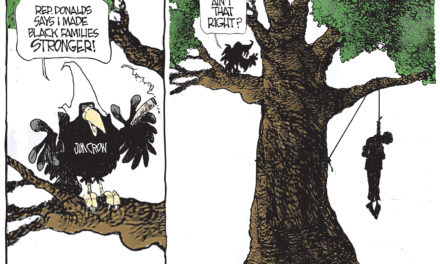There’s an axiom that government staff members live by. When an elected official gets emotional or strident about an issue, it’s not political. It’s personal.
These are always the worse kind of issues for employees and other elected officials to navigate, because they become a no-holds barred kind of political fight that refuses compromise or moderation. That’s why the emerging sentiment in the Shelby County Administration Building these days is that Shelby County Commissioner Henri Brooks’ war on Juvenile Court is just such a personal battle.
Before September 1 of last year, long-time employees joked that they had seen it all, but even the most jaded among them shake their heads over the extent to which the commissioner is going to eviscerate anyone who disagrees with her opinion that Juvenile Court is a judicial plantation.
Making A Federal Case Out Of It
This week, her campaign took her to the Department of Justice in Washington, D.C., where she filed a complaint of discrimination against Juvenile Court. Somehow, the notion of the Justice Department mounting a serious investigation into a complaint filed by a Democratic legislator against a Republican Juvenile Court judge doesn’t sound like it’s got legs, but then again, maybe we’re just too cynical.
Meanwhile, back in Memphis, some in the county building worry that Commissioner Brooks is becoming the face of Shelby County Government and single-handedly dynamiting the last vestiges of civility on the legislative body. Even those who side with her concede that it’s in pursuit of keeping the Democratic voting majority together, and they just wish the overheated tone of the issue would ease up.
A case in point for them is last night’s interview on WMC-TV of Commissioner Brooks. In it, she said that one reason she went to the Justice Department was to save the county money. Her logic: the Justice Department could conduct the much-needed review of Juvenile Court and that would eliminate the need for the analysis of Juvenile Court proposed by Commissioner Mike Carpenter.
Wishful Thinking
The idea that the U.S. Justice Department conducts these kinds of free operational and organizational reviews of various courts across the U.S. is of course wishful thinking or willful misdirection. More and more, Commissioner Carpenter’s recommendation for an independent study of Juvenile Court gains credibility as the logical course of action.
In perfect world, the board of commissioners would wait for the results of such a study before appointing the second judge coveted by the Democratic majority, but county government these days is hardly a perfect world. The days when staff members joked about City Council are long past, and these days, many look longingly across the street to City Hall.
It’s an amazing turnaround for a body that was long held up as a model local legislative branch, and it’s even more amazing that the other 12 commissioners have made no real moves to rein in a member who appears to be disrupting committee meetings and ignoring long-established rules for the board of commissioners.
Juvenile Behavior
In the end, all of this sparks an endless amount of speculation about the reasons for her unrelenting attacks and the accompanying hysterical comments about Juvenile Court. It leads many to believe that there’s something personal at work, and they conclude that it springs from her time as an employee at Juvenile Court, and the issue of the second judge issue gives her a chance for payback for the circumstances of her departure there.
Regardless of the cause, these are difficult days for anyone seeking to conduct business with the board of commissioners, and as we’ve noted before, it’s curious that with all the pressing issues facing Shelby County Government, this is the one that the Democratic majority has decided to invest its energy and political capital in.
At this point, it’s not as much about Juvenile Court as it is about winning and losing, and in that kind of environment, it’s hard to see an ending that won’t ultimately exact a heavy cost on county government.



